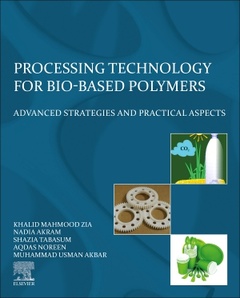Description
Processing Technology for Bio-Based Polymers
Advanced Strategies and Practical Aspects
Authors: Zia Khalid Mahmood, Akram Nadia, Tabasum Shazia, Noreen Aqdas, Akbar Muhammad Usman
Language: English
Subjects for Processing Technology for Bio-Based Polymers:
Keywords
3D printing; Bio refinery; Bio-based material; Bio-based polymer processing industry; Bio-based polymers; Bio-based polymers processing; Bio-based products; Bio-composites; Biodegradable polymers; Biopolymers; Blow molding; Challenges; Compression molding; Concluding remarks; Current status; Direct extraction from biomass; Drug delivery; Economic and environmental impact; Electron spinning; Extraction process; Extrusion process; Fermentation; Future prospects; Future trends; Genetically adapted bacteria; Green chemistry; Hot pressing; Industrial applications; Injection molding; Medical applications; Melt blending; Melt extrusion; Microbial production; Microwave irradiation; Opportunities of resource materials; Polymers synthesized by microorganisms; Processing; Processing techniques; Reactive extrusion; Renewable bio-based monomers; Strategies; Thermoforming; Tissue engineering; Wound healing
208.67 €
In Print (Delivery period: 14 days).
Add to cart304 p. · 19x23.3 cm · Paperback
Description
/li>Contents
/li>Biography
/li>Comment
/li>
Processing Technology for Bio-Based Polymers: Advanced Strategies and Practical Aspects brings together the latest advances and novel technologies surrounding the synthesis and manufacture of biopolymers, ranging from bio-based polymers to synthetic polymers from bio-derived monomers. Sections examine bio-based polymer chemistry, discuss polymerization process and emerging design technologies, cover manufacturing and processing approaches, explain cutting-edge approaches and innovative applications, and focus on biomedicals and other key application areas. Final chapters provide detailed discussion and an analysis of economic and environmental concerns, practical considerations, challenges, opportunities and future trends.
This is a valuable resource for researchers, scientists and advanced students in polymer science, bio-based materials, nanomaterials, plastics engineering, biomaterials, chemistry, biotechnology, and materials science and engineering, as well as R&D professionals, engineers and industrialists interested in the development of biopolymers for advanced products and applications.
She completed her Ph.D on synthesis and characterization of polyurethane based pressure sensitive adhesives Containing aliphatic diisocyante, and her research is focused on synthetic and bio-based polymers and composites, as well as biodegradation of fabric dyes. She also has a strong command of developing synthetic routes for polymer products and the interpretation of data. Dr. Akram has published 21 research publications with high impact factor journals, authored 5 book chapters, and has actively participated as a speaker at national and international conferences.
She received her PhD in Chemistry from Government College University, Faisalabad, which she completed under the Higher Education Commission indigenous scholarship. Dr. Tabasum has extensive experience in synthetic and bio-based polymers especially in applied industry, and her PhD was focused on synthesis, characterization, and applications of polyurethane acrylate copolymers for wet textile processing. She has published multiple articles and book chapters, as well as supervising a number of M.Phil and PhD scholars.
She completed her Ph.D. in Applied Chemistry specialized in the synthesis and characterization of PLA-g-hydroxyethyl cellulose-based polyurethanes with potential as biomedical implants. She has strong expertise in the development of synthetic routes for bio-based polymer products and interpretation of data, and her research is being funded by the International Foundation for Science, Sweden. Dr. Noreen has authored or co-authored 26 articles and 6 book chapters. For her contributions in the field, GCUF bestowed her with the Outstanding Researcher Award for the years 2016, 2017 and 2018.
Muhammad Usman Akbar is a Senior Chemist and Quality Control Specialist, at Rafhan Maize Product Co. Ltd. (Ingredion, USA), based in Faisalabad, Pakistan. He also previously worked as visiting Assistant Pr
- Focuses on the processing of bio-based polymers, covering both traditional methods and innovative new approaches
- Offers novel opportunities and ideas for developing or improving technologies for biopolymer research, preparation and application
- Examines other key considerations, including reliability and end product, economic concerns, and environmental and lifecycle aspects




